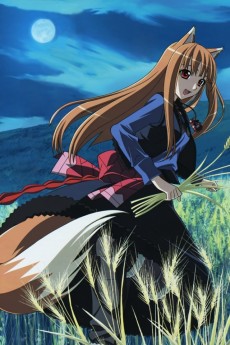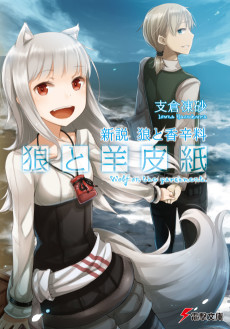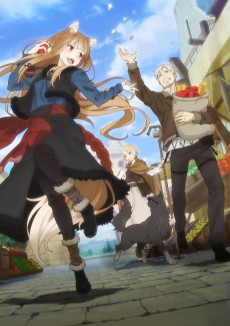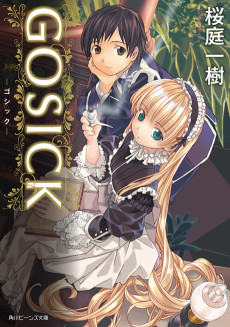OOKAMI TO KOUSHINRYOU
STATUS
RELEASING
VOLUMES
Not Available
RELEASE
Invalid Date
CHAPTERS
Not Available
DESCRIPTION
The life of a traveling merchant is a lonely one, a fact with which Kraft Lawrence is well acquainted. Wandering from town to town with just his horse, cart, and whatever wares have come his way, the peddler has pretty well settled into his routine—that is, until the night Lawrence finds a wolf goddess asleep in his cart. Taking the form of a fetching girl with wolf ears and a tail, Holo has wearied of tending to harvests in the countryside and strikes up a bargain with the merchant to lend him the cunning of “Holo the Wisewolf” to increase his profits in exchange for taking her along on his travels. What kind of businessman could turn down such an offer? Lawrence soon learns, though, that having an ancient goddess as a traveling companion can be a bit of a mixed blessing. Will this wolf girl turn out to be too wild to tame?
(Source: Yen Press)
CAST

Holo

Kraft Lawrence

Elsa Schtingheim

Nora Arendt

Myuri

Dian Rubens

Fleur Boland

Col Tote

Helena

Evan Gyoam

Fermi Amarty

Zheren

Merta

Ted Reynolds

Lud Kiemann

Louis Schtinghilt

Marten Liebert

Kalm
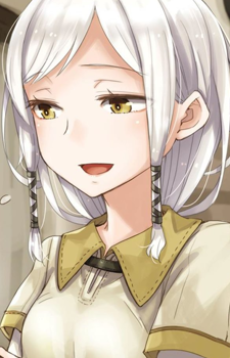
Selim

Hanna

Hans Remelio

Yergin

Amalie Draustem-Hadish

Harod
CHAPTERS
RELATED TO OOKAMI TO KOUSHINRYOU
 ANIME AdventureOokami to Koushinryou
ANIME AdventureOokami to Koushinryou ANIME AdventureOokami to Koushinryou II
ANIME AdventureOokami to Koushinryou II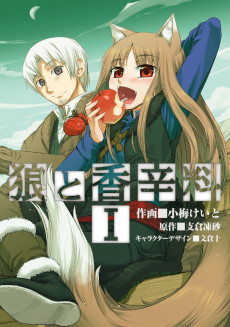 MANGA AdventureOokami to Koushinryou
MANGA AdventureOokami to KoushinryouREVIEWS

SgtBateMan
91/100The right arrangement is Wolf & Spice.Continue on AniListOokami to Koshinryo, or also known as Spice & Wolf in English, is a light novel series written by Isuna Hasekura and illustrated by Jyuu Ayakura. The English translation is in the order of Alphabet, which makes it more natural to pronounce than Wolf & Spice, but certainly when bring the work into discussion, we have to follow the original arrangement to make the most out of it. __Wolf__ Wolf, or scientifically Canis iupus, is a widely-known species, mostly because they are the ancestors of many kinds of domestic dogs. They are known as the kind of animal being able of patience and scheming while pursuing their prey. When talking about wolves, the first image from our imagination is often a single lone individual, which is portrayed more frequently than their other trait, wolf’s pack. In addition, scientific researches have also pointed out that lone wolves, or mated pairs, possess higher rate of success in hunting than a large pack. So what the hell does it matter, other than a leading characters is a wolf herself, and being able to transform into human? That is not to mention the fact she had separated herself from the pack for quite a long time, so long that she had forgotten the way to home, to the point she had to form a situational bond with the other leading character, in order to find the long and winding road stretching to her place of birth. What a convenient plot device... Yeah, what I said previously is only relevant to the content to some extent, but what following is the true core of this series. Wolf, the kind of animal being able to plan and wait for the right moment to strike, is the reference to merchant, an occupation still existing nowadays, and the origin of businessman, or businesswoman, which is in larger scale, like operating a company or corporation. Merchants were often in business of a particular merchandise in a particular time, very competitive to each other for supplies, profit and information, which connects those previously mentioned. As a result, merchants often worked alone, and were not easily to trust, because they would do anything profitable, even with deception. However, when having a common objective, the greater good, merchants were also being able to cooperate with others, which explains the existence of merchant guild. As a result, the plot is heavily on the side of wolf-like..., sorry for my bad English, business-like talk, about how to take advantage of their circumstances to earn as much profit as possible, how to sell their goods at the possibly highest price, trading,… These economical topics are really uninteresting to many, but the author has tried his best to keep it simply as much as possible, and how the plot progresses could be understood without much knowledge in that particular department, as long as you are able to summarise and organise the given information. Also, set in the Middle Age Europe, such occupation was widely known as traveling merchant, due to historical facts. In order to be one, merchants had to abandon their citizenship to travel, and ironically, dreamt of someday being able to once again obtain such SHIP, when they decided to settle. As a matter of fact, a merchant often had no fixed accommodation, and their life stuck with the roads their carriage(s) traveled on. They were more exposed to nature, and like an old saying, risks there were like a wolf waiting for such an unstable life. If fortunately, you could avoid mishappens and live a good and well-being life. Else, you would have to deal with the harshness of wilderness, such as accidents and natural disasters, or being the victims of wolves, unsurprisingly, or bandits, which could easily take away all the goods costing your entire fortune, or worse, your life. Also, you had to accept the risk of losing, being deceived, put into debt, and your investments didn’t always bear fruit. The characters in the story were many times put into such situations, and despite its simplicity, the author has managed to work out the complex portrayal of its instability, as his intention was never to colour a merchant’s life in pink to begin with. __Spice__ Spices, such as pepper, were luxuries in the Middle Age, due to many problems in logistics, which were also in the list of goods the characters would sell. They are the decisive factor of a good meal, because simply cooking meat, fish, vegetable with heat wouldn’t automatically make them tasty. Definitely, I once again talked of bullshit for a whole paragraph, but there are indeed some spices I have found within the work namely Ookami to Koshinryo in its original language. We know life on the road for merchants was such a hardship. However, when they opened their eyes in the morning and had another day doing their professionals, it was quite a minor happiness. When they traveled in the speed that could make them vomit blood, just to make sure their goods arrive in time of the best business, or to overcome the danger they had been in, preserved their lifetime’s investment and eventually earned quite a fortune out of it, it was then time for celebration, and the taste of beer, wine and food at that time was surely delicious. Joy, indeed, tastes very good. Speaking of Europe in Middle Age, we have been provided a map with plains separated by ranges of mountains, cities on the bank of rivers surrounded with walls, paddies of buckwheat, and forests of conifers covered in snow during winter further northwards, with religious and cultural festivals held in places the journey came across, as well as the Church, which is very alike to the description of the continent. Therefore, it would be no surprise, or in fact quite an astonishment, to see words written in German in many scenes from the adaptations, which results in the quite simple, yet effective and realistic world building.  Due to the concept of traveling merchants, the conversations within this series tend to be business-like, which is not quite appealing and consists of many ‘actions’, if you know what I meant. However, the characters kept conversing with each other, and that’s more than enough to learn of them. The side characters could be said to be disposable, but since the journey would be quite long and there would hardly be a chance for them to return, I believe they had fulfilled their task, not to mention they felt quite natural at their respective roles of the stories. As a consequence, the interaction was mostly between the protagonists, and the readers are able to witness their changes.
Kraft Lawrence, or Kraft Lorenz, was a calculating merchant with years in the business. Like any other peers, he also dreamed of a settlement in a city, a family of his own, and a successful career of trading merchandises, and had been working his a-- off for it. However, that is not to say that he was extraordinary or anything, as there were many times he let the greed blind his eyes and put himself between the rock and a hard place, or desperately ran away from the dangers that he alone could not do much against. We could say he was naturally described as a typical merchant.
Holo, the self-proclaimed Wise Wolf, was a mythic existence having resided in Pasloe for 700 of years. Living up with her words, she was indeed knowledgeable, and with her living experiences, she often made fun of Lawrence, who was indeed a child in comparison to her. As of her origin, she was born in the forest of Yoitsu, and after a long sleep, she had been left alone, so Holo had decided to set off, in order to find her kinds, which ended up with settling in Pasloe as a Guardian. As the time changed, her role was no longer necessary, so she offered Lawrence to take her back to Yoitsu, in exchange of her support for his business.
So began their adventure, and the more they interacted, the more opening-up they were to each other. Holo was typically very haughty and self-sufficient, though due to her isolation for hundreds of years in Pasloe, Holo had gradually felt very lonely, not to mention she left Yoitsu due to her state of being left behind in the first place, and sometimes showed a more fragile side of herself. She relied on Lawrence for company as she feared loneliness, which is quite understandable for being with perception of its own existence, and could be said quite human as well. Lawrence, in exchange, got helped with her wisdom to increase his profits and get him out of jams. He had gradually got out of his calculating self of a merchant, started caring for his companion, not because of the preservation for his investment, but because of his honest will to do so. Her loneliness was something that Lawrence was very aware of and had tried to comfort her in his own way. As such, we were able to witness how two independent, solitary wolves, literally and figuratively, formed their own pack, and that is one of the spices used in this series. Also, as their relationship progressed, we were also able to see how Lawrence turned the table against Holo, and got onto the stage of big teasers.
Something worthy of mentioning here is the fact that during the nights of traveling, under the heaving light of the campfire, myths that the merchants had heard, or those from the place they were staying or heading to, were such interesting things to kill the time. Such myths, also appeared in Spice & Wolf, consequently increased the mysterious aspect of the work. Further more, reading the novel also feels like being able to take a walk inside the mythology itself, because the existence of Holo has been giving out the sensation of legends coming true.
__Conclusion__
This is one of the very few works that are quite simple, yet the simplicity has created such a superiority that many breathtaking actions and suspense, dramatic romance and relationship, or big fat voluptuous round anime tiddies, panty shots or weird fan service camera angles couldn’t achieve.
Due to the concept of traveling merchants, the conversations within this series tend to be business-like, which is not quite appealing and consists of many ‘actions’, if you know what I meant. However, the characters kept conversing with each other, and that’s more than enough to learn of them. The side characters could be said to be disposable, but since the journey would be quite long and there would hardly be a chance for them to return, I believe they had fulfilled their task, not to mention they felt quite natural at their respective roles of the stories. As a consequence, the interaction was mostly between the protagonists, and the readers are able to witness their changes.
Kraft Lawrence, or Kraft Lorenz, was a calculating merchant with years in the business. Like any other peers, he also dreamed of a settlement in a city, a family of his own, and a successful career of trading merchandises, and had been working his a-- off for it. However, that is not to say that he was extraordinary or anything, as there were many times he let the greed blind his eyes and put himself between the rock and a hard place, or desperately ran away from the dangers that he alone could not do much against. We could say he was naturally described as a typical merchant.
Holo, the self-proclaimed Wise Wolf, was a mythic existence having resided in Pasloe for 700 of years. Living up with her words, she was indeed knowledgeable, and with her living experiences, she often made fun of Lawrence, who was indeed a child in comparison to her. As of her origin, she was born in the forest of Yoitsu, and after a long sleep, she had been left alone, so Holo had decided to set off, in order to find her kinds, which ended up with settling in Pasloe as a Guardian. As the time changed, her role was no longer necessary, so she offered Lawrence to take her back to Yoitsu, in exchange of her support for his business.
So began their adventure, and the more they interacted, the more opening-up they were to each other. Holo was typically very haughty and self-sufficient, though due to her isolation for hundreds of years in Pasloe, Holo had gradually felt very lonely, not to mention she left Yoitsu due to her state of being left behind in the first place, and sometimes showed a more fragile side of herself. She relied on Lawrence for company as she feared loneliness, which is quite understandable for being with perception of its own existence, and could be said quite human as well. Lawrence, in exchange, got helped with her wisdom to increase his profits and get him out of jams. He had gradually got out of his calculating self of a merchant, started caring for his companion, not because of the preservation for his investment, but because of his honest will to do so. Her loneliness was something that Lawrence was very aware of and had tried to comfort her in his own way. As such, we were able to witness how two independent, solitary wolves, literally and figuratively, formed their own pack, and that is one of the spices used in this series. Also, as their relationship progressed, we were also able to see how Lawrence turned the table against Holo, and got onto the stage of big teasers.
Something worthy of mentioning here is the fact that during the nights of traveling, under the heaving light of the campfire, myths that the merchants had heard, or those from the place they were staying or heading to, were such interesting things to kill the time. Such myths, also appeared in Spice & Wolf, consequently increased the mysterious aspect of the work. Further more, reading the novel also feels like being able to take a walk inside the mythology itself, because the existence of Holo has been giving out the sensation of legends coming true.
__Conclusion__
This is one of the very few works that are quite simple, yet the simplicity has created such a superiority that many breathtaking actions and suspense, dramatic romance and relationship, or big fat voluptuous round anime tiddies, panty shots or weird fan service camera angles couldn’t achieve.
 Charming, enjoyable by all age groups, calm and beautiful in its manifold details, Spice and Wolf is a delight to sit down after a long day and simply let the evening flow.
Charming, enjoyable by all age groups, calm and beautiful in its manifold details, Spice and Wolf is a delight to sit down after a long day and simply let the evening flow.
katsuragiis
100/100'Time is money, and money is time.'Continue on AniList'Strike while the iron is hot.'. This is a phrase used commonly in sales, often to encourage the immediate use of one's coin. Like this very coin, word is too passed down from one soul to another, and shall begin an eternal cycle of circulation and surely endure countless recalls-- wherein it will find itself being cast absentmindedly into the gaping maw of conversation. Words possess more weight than even all the coins in the world could hope to compare to, and the stories they unite together to form are powerful, binding things that even spells and swords cannot hope to pierce. 'Spice and Wolf' weaves spoken word, legend, love, trade, and tragedy together to touch the soul in such a way that can only be described as heartwrenching.
With the first volume released (shockingly) in the noble year of 2006, series' author Isuna Hasekura delivers unto readers a story that feels almost legendary in its composition, as if the pages should be made from freshly cut and traded birch and bound tightly with leather. A traveling merchant finds himself face to face with a goddess of the harvest, and the two set out for the north together-- a story fit perfectly to be told among patrons at some medieval bar with the scents of cheap wine fresh on their breaths. This should speak volumes to the quality of its composition by way of comparison, though if that's not enough to sell you on it then you're worth your salt. In this book we, as readers, come to understand trade and bargaining as explained through countless witty exchanges and deals between our main characters and the merchants they come to know. In any other case, you'd be right to find this sort of thing being unbearable, with such things as trade and commerce being eye-rollers at a first glance; yet where many other novels would seek to spin you long-winded tales about a land's magic and its large catalogue of spells to sell you on its world that way, 'Spice and Wolf' does so with appraisal, bargaining, and contracts. A merchant's incantation invokes sale, and these words fall upon the eager buyer's open ears. Speaking at a wider scale to the above claim, I feel that this story in particular manages to make footholds of the places where many a fantasy book falter. The genre has become oversaturated with enough conflated, grandiose, and thin stories that leave little of the world to be imagined: often explaining needlessly in places where imagination cannot reach because the world is too static.
Beyond the exterior of an amazing composition lies a deeper story about the love and closeness that one can feel with another, as well as the heartbreak and turmoil of losing them. Everyone has 'that person'. Someone you perhaps let get away, someone you had to let go of or separate from for one reason or another, and in those moments of loss where waves of despair wash over oneself like the coming tide, what primal, selfish feelings we display is nothing short of ghoulish to an outside party. As humans, we are greedy creatures who lust only for more: more time, more money, more daylight-- This book has undoubtedly taught me this and so, so much more with its shades of mystery contrasting perfectly its taste for a palette of action and drama. As a reader, it's not often that you find a body of work that seems to beg you to cry out into the night, to feverishly ask you to shout out and tear at your vocal cords, so when you're met with this fleeting feeling it's up to you to chase it. Truly a book like no other, with a story and characters to match. Recommended for anyone, no matter the age or familiarity with books.
SIMILAR MANGAS YOU MAY LIKE
 NOVEL AdventureWorld End Economica
NOVEL AdventureWorld End Economica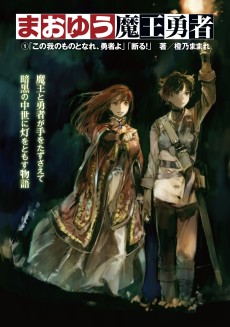 NOVEL ActionMaoyuu Maou Yuusha
NOVEL ActionMaoyuu Maou Yuusha NOVEL AdventureMajo no Tabitabi
NOVEL AdventureMajo no Tabitabi NOVEL AdventureMagdala de Nemure
NOVEL AdventureMagdala de Nemure NOVEL ComedySasaki to Pii-chan
NOVEL ComedySasaki to Pii-chan NOVEL AdventureZero kara Hajimeru Mahou no Sho
NOVEL AdventureZero kara Hajimeru Mahou no Sho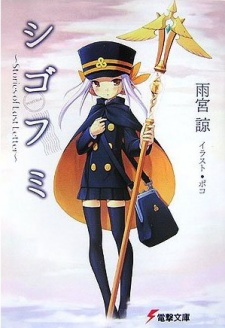 NOVEL SupernaturalShigofumi: Stories of Last Letter
NOVEL SupernaturalShigofumi: Stories of Last Letter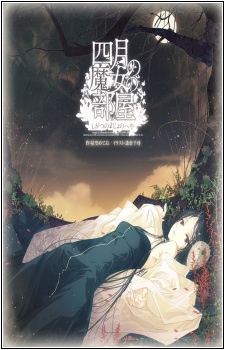 NOVEL FantasyShigatsu no Majo no Heya
NOVEL FantasyShigatsu no Majo no Heya
SCORE
- (4.35/5)
MORE INFO
Favorited by 1,039 Users


